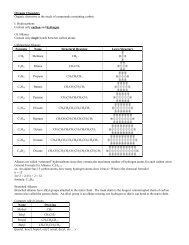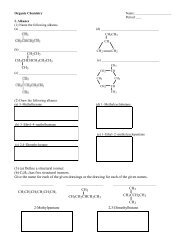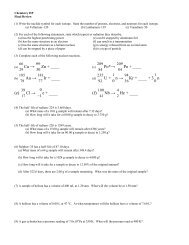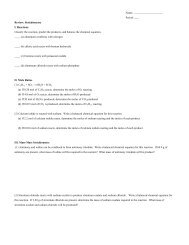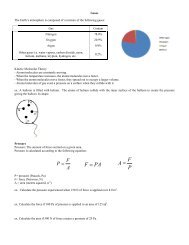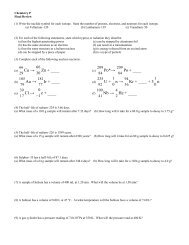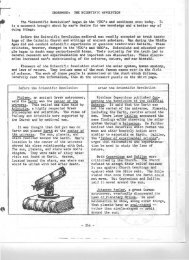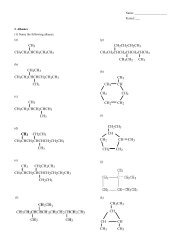Sharecropping [the “crop lien” system] – if farmers [usually in South] were unable to pay theirdebts [for supplies], they had to promise to pay with their crops. The crops would rarely beworth enough, so they would borrow more, etc.Economic Change – in the South, yeoman farmers were being pushed into cotton raising b/cof the debts incurred during the war [it was no longer practical to grow own food]. This madethe debt situation worse and put them at the mercy of merchants. In the Midwest, the probleminvolved dropping prices [due to technological advances] that necessitated increases inproduction. But since costs weren’t dropping, many farmers got stuck big time.Price Inflation/Interest Rate - to make matters worse, merchants took advantage by charginginsane interest and inflating prices.RRD Exploitation – see aboveWeather/Bugs – well, the industrialists also played a part by making mail order bugs thatfarmers could let loose on <strong>com</strong>petitors, as well as portable hurricanes. Haha…just kidding!- Grange Movement (1870s) – farmers formed a network of Granges w/elected officers and membershipoaths. E/t they began as social things, Granges soon turned to economics/politics. This didn’t work so well,though [they elected people, but couldn’t fight the corporations], so Granges declined in the late 1870s. Inthe Southwest, Mexican farmers also organized into the White Hats [“Gorras Blancas”], who were againstthe encroachment of English ranchers on their traditional lands, but this failed too.- Farmers’ Alliances (1890s) – there were two (Great Plains & South). They began in Texas, and weregenerally groups of small farmers that were trying to <strong>com</strong>bat big money, esp. RRDs. Like the Granges, theyheld rallies, educational meetings, and had cooperative buying and selling agreements.- Subtreasury Plan – proposed by the FA, this was a plan to help indebted farmers that called for thefederal gov’t to build warehouses where farmers could keep crops [and receive loans at 80% of the marketprice] while they waited for higher prices. Also, the gov’t would give low-interest loans to land buyers. Thiswas meant to inject cash into the economy and raise crop prices while keeping others the same.- E/t early attempts at merging were sabotaged by sectional differences, both Alliances eventually formed athird party in Omaha 1892 – the Populist Party. The Populists nominated Weaver for the 1892 election, andhe ran on the Omaha Platform, which called for gov’t ownership of utilities and RRDs, gov’t ownership ofland, farm loans, expansion of the currency, an in<strong>com</strong>e tax, direct election of Senators, and a shorter wkday.- Of course, Weaver lost to Cleveland, but the Populists gained support through their wild speeches, etc.*The Depression of the 1890s*- The Depression of the 1890s really started in 1893 with the collapse of the Nat’l Cordage Company, which,like many other RRDs and manufacturers, had borrowed too much and was unable to pay its debts. To try tomake up for their debt, <strong>com</strong>panies bought more equipment and worked people harder – but all that did wasmake workers lose money as well. So <strong>com</strong>panies closed, banks closed…overall, it sucked.- The worst of it was between 1893 and 1895…people lost money, so they didn’t want to buy things, soprices dropped more, so wages dropped more…you get the picture. Currency was still a problem, as thegold reserves were dropping due to a silver boom, and the more the gold dropped, the more people tried toredeem their securities.- As a result, the Sherman Act was repealed in 1893, but people STILL didn’t stop, which forced Clevelandto accept an offer from J.P. Morgan (in return for bonds, which they resold for profit). This got Cleveland introuble with his fellow Democrats and wasn’t even that beneficial, as the economy crashed again in 1895before it began to rise back up due to gold discoveries in Alaska, good harvests, and industrial growth.- Strangely enough, the Depression was the last element in cementing the new national economy, b/c itwiped out lots of the weaker industries, I guess.*Depression Era Protests*- The first real protests were in 1877 [the RRD strikes], and they were followed by the Haymarket Riot(1866), Carnegie Steel strikes in 1892, violence at a silver mine (also in 1892), etc. These events scared thecrap out of many well-off people, who thought, “Oh my GOD …the ANARCHISTS are behind it all.”- This actually wasn’t true at all, though. There were some socialists in <strong>Am</strong>erica, but it didn’t work out so wellb/c of factionalism and the constant temptation to get ahead via the capitalist system. The biggest socialistleader, Eugene V. Debs, emerged in the aftermath of the 1894 Pullman car strike – but e/t he did form theSocialist Party of <strong>Am</strong>erica, not much came of it until the next century.- In 1894, another popular movement, Coxey’s Army, got a lot of attention. Coxey, who advocated publicworks projects and low-interest gov’t loans, led a huge number of farmers/unemployed people on a march tothe capital. On the day of the demonstration, however, police stopped the protestors and arrested Coxey.*The Election of 1896*48
- The Populists prepared to run again in the Presidential Election of 1896 – they were doing well, but theirbiggest problem was lack of organization, and the effects of racism. The big issue, as they saw it, was thecoinage of silver, which they promoted as the obvious sol’n to the country’s economic problems.- But Populists still faced one decision: should they semi-join one of the major party factions, or should theystay totally independent (and not win as many votes)? Republicans were obviously out of the question, asthey supported big-business and the gold standard, but union w/the Democrats didn’t seem that bad.- Anyhow, the Republicans went ahead and nominated William McKinley [at the suggestion of MarcusHanna, an Ohio industrialist] w/o any problems; their only crisis was that, in response to their gold policies, asmall group of silver Republicans walked out.- The Democrats, on the other hand, became obsessed w/silver and nominated big orator guy WilliamJennings Byran, who wrote the famous convention pro-silver speech [of course, some gold Democrats hadto go and walk out, but who cares about them].- As a result, the Populists decided to go w/Bryan and the Democrats, only w/a different VP nominee. So,the campaign began. Bryan went on an all out speaking tour full of emotion, evangelicalism, and all that.McKinley sat at home on his butt and waited for the press to <strong>com</strong>e to him so he could tell them about thenew jobs he’d make w/his protective tariffs.- What happened? McKinley killed Bryan, partially b/c the urban-rural coalition the Populists wanted hadn’thappened b/c of their silver obsession [took away from other reforms, and urban workers thought it wouldlower the value of their wages].- Naturally, McKinley signed the Gold Standard Act (1900), which required that all paper money had to bebacked by gold; he also raised tariffs and encouraged imperialism. The economy improved, but mainly b/c ofthe gold discoveries in Alaska, not b/c of McKinley. Nobody cared though, so they elected him again.The Progressive Era (1895 – 1920)*Progressivism: An Overview*- In 1912, a new party emerged on the political scene, calling themselves the Progressives. The formationof the party was actually the culmination of a series of reform movements that began in the 1890s.- Some general CAUSES of Progressivism: The 1890s – Yes, the 1890s were a cause of Progressivism, mainly b/c they sucked. In the1890s, all the tensions built up during industrialization broke loose in the Panic of 1893, laborproblems, political issues, and foreign entanglements. Capitalism OUT OF CONTROL – Partially b/c of the depression, many people started torealize that capitalism, w/its monopolistic tendencies and rampant destruction of naturalresources, needed just a bit of restraint. Screwed-Up Cities – Disease, poverty and crime were often rampant. Immigration and the rise of a new socio-economic elite – This made people nervous.- The bottom line of Progressivism was basically this: SOCIETY IS RESPONSIBLE FOR INDIVIDUALSAND SHOULD HELP THEM – as opposed to Gilded Age every-man-for-himself Social Darwinism. Thismanifested itself through a desire to: End Abuses of Power – Trust-busting, consumers’ rights, good government. Build New Institutions – Schools, hospitals, all that crap. Be Efficient – “Wow! Let’s make our political and social institutions just like factories!” Well, thatmight explain the way school is, but anyway… Achieve Perfection – Yeah, they really thought it could happen. Geez.*Politics in the Progressive Era*- During the PE, party loyalty and voter turnout declined as politics opened to new interest groups, each ofwhich had their own agendas – i.e. the Progressive Era witnessed the birth of that delightful phenomenon:the nationwide [charitable] organization that calls your house and asks you for money eight times a day.These organizations included: professional groups, women’s organizations, issue-oriented groups, civicclubs, and minority groups. So, politics became more fragmented and issue-driven.- Politics also became more open to foreign models/ideas and reform took on a far more urban orientation,as opposed to the Populist movement that culminated in the 1896 election. This was partially due to theleadership of the new middle class [professionals], who lived in the cities.- Another novelty was Muckraking Journalism – i.e. journalists who <strong>com</strong>bined the public’s love of scandalw/exposes of social/political injustices. Names to know: Steffen’s The Shame of the Cities (1904), UptonSinclair’s The Jungle (1906), Ida Tarbell [Standard Oil].49
- Page 3 and 4: Congregationalists (Puritans) - The
- Page 5 and 6: - So the Restoration Colonies, form
- Page 7 and 8: - So in England, where they were lo
- Page 9 and 10: *Colonial Politics 1700-1750: Relat
- Page 11 and 12: - Another ideology that was beginni
- Page 13 and 14: - The Quebec Acts were passed aroun
- Page 15 and 16: - So, by 1782, what had seemed to b
- Page 17 and 18: on the economic side, since the gov
- Page 19 and 20: - Anyway, Congress had several ques
- Page 21 and 22: - Adams was still in the early Wash
- Page 23 and 24: *Political Factionalism and Jeffers
- Page 25 and 26: - Samuel Slater set up the first te
- Page 27 and 28: - Court rulings extended the powers
- Page 29 and 30: Revival, Reform and Politics during
- Page 31 and 32: - Anyhow, during his administration
- Page 33 and 34: TEXAS (Southerners) - Texas had bee
- Page 35 and 36: - Anyhow, Pierce’s total support
- Page 37 and 38: They had a smaller everything: smal
- Page 39 and 40: - The two Northern victories at the
- Page 41 and 42: - The result was the Fourteenth Ame
- Page 43 and 44: The Slaughter-House Cases (1873) -
- Page 45 and 46: in the arrest of 8 immigrant radica
- Page 47: case (1897 - ICC can’t set rates)
- Page 51 and 52: - MOST IMPORTANTLY, though, was the
- Page 53 and 54: - So, what led the US to undertake
- Page 55 and 56: - The rebellion, led by Emilio Agui
- Page 57 and 58: - Still, Americans managed to turn
- Page 59 and 60: - So - the point of this episode? B
- Page 62 and 63: *Hoover’s Response*- Poor Herbert
- Page 64 and 65: - In FDR’s second term, however,
- Page 66 and 67: Dominican Republic - When we left i
- Page 68 and 69: World War II (1941 - 1945)*The Cour
- Page 70 and 71: - So Truman started off again all c
- Page 72 and 73: - First of all, the 1950s were (for
- Page 74 and 75: peace w/Japan that ended occupation
- Page 76: - France wanted out, so at the Gene



